Buffer for characters
// CharBuffer.cs
//
// Copyright (C) 2003-2004 Ryan Seghers
//
// This software is provided AS IS. No warranty is granted,
// neither expressed nor implied. USE THIS SOFTWARE AT YOUR OWN RISK.
// NO REPRESENTATION OF MERCHANTABILITY or FITNESS FOR ANY
// PURPOSE is given.
//
// License to use this software is limited by the following terms:
// 1) This code may be used in any program, including programs developed
// for commercial purposes, provided that this notice is included verbatim.
//
// Also, in return for using this code, please attempt to make your fixes and
// updates available in some way, such as by sending your updates to the
// author.
using System;
namespace RTools_NTS.Util
{
/// <summary>
/// Buffer for characters. This approximates StringBuilder
/// but is designed to be faster for specific operations.
/// This is about 30% faster for the operations I'm interested in
/// (Append, Clear, Length, ToString).
/// This trades off memory for speed.
/// </summary>
/// <remarks>
/// <para>To make Remove from the head fast, this is implemented
/// as a ring buffer.</para>
/// <para>This uses head and tail indices into a fixed-size
/// array. This will grow the array as necessary.</para>
/// </remarks>
public class CharBuffer
{
#region Fields
int capacity = 128;
char[] buffer;
int headIndex; // index of first char
int tailIndex; // index 1 past last char
#endregion
#region Properties
/// <summary>
/// Gets/Sets the number of characters in the character buffer.
/// Increasing the length this way provides indeterminate results.
/// </summary>
public int Length
{
get { return(tailIndex - headIndex); }
set
{
tailIndex = headIndex + value;
if (tailIndex >= capacity) throw new
IndexOutOfRangeException("Tail index greater than capacity");
}
}
/// <summary>
/// Returns the capacity of this character buffer.
/// </summary>
public int Capacity
{
get { return(capacity); }
}
#endregion
#region Constructors
/// <summary>
/// Default constructor.
/// </summary>
public CharBuffer()
{
buffer = new char[capacity];
}
/// <summary>
/// Construct with a specific capacity.
/// </summary>
/// <param name="capacity"></param>
public CharBuffer(int capacity)
{
this.capacity = capacity;
buffer = new char[capacity];
}
#endregion
#region Non-Public Methods
/// <summary>
/// Reallocate the buffer to be larger. For the new size, this
/// uses the max of the requested length and double the current
/// capacity.
/// This does not shift, meaning it does not change the head or
/// tail indices.
/// </summary>
/// <param name="requestedLen">The new requested length.</param>
protected void Grow(int requestedLen)
{
int newLen = Math.Max(capacity*2, requestedLen);
newLen = Math.Max(newLen, 16);
char[] newBuffer = new char[newLen];
Array.Copy(buffer, 0, newBuffer, 0, capacity);
buffer = newBuffer;
capacity = newLen;
}
/// <summary>
/// Ensure that we're set for the requested length by
/// potentially growing or shifting contents.
/// </summary>
/// <param name="requestedLength"></param>
protected void CheckCapacity(int requestedLength)
{
if (requestedLength + headIndex >= capacity)
{
// have to do something
if ((requestedLength + headIndex > (capacity >> 1))
&& (requestedLength < capacity - 1))
{
// we're more than half-way through the buffer, and shifting is enough
// so just shift
ShiftToZero();
}
else
{
// not far into buffer or shift wouldn't be enough anyway
Grow(0);
}
}
}
/// <summary>
/// Move the buffer contents such that headIndex becomes 0.
/// </summary>
protected void ShiftToZero()
{
int len = Length;
for (int i = 0; i < len; i++)
{
buffer[i] = buffer[i + headIndex];
}
headIndex = 0;
tailIndex = len;
}
#endregion
#region Public Methods and Indexer
/// <summary>
/// Overwrite this object's underlying buffer with the specified
/// buffer.
/// </summary>
/// <param name="b">The character array.</param>
/// <param name="len">The number of characters to consider filled
/// in the input buffer.</param>
public void SetBuffer(char[] b, int len)
{
capacity = b.Length;
buffer = b;
headIndex = 0;
tailIndex = len;
}
/// <summary>
/// Append a character to this buffer.
/// </summary>
/// <param name="c"></param>
public void Append(char c)
{
if (tailIndex >= capacity) CheckCapacity(Length + 1);
buffer[tailIndex++] = c;
}
/// <summary>
/// Append a string to this buffer.
/// </summary>
/// <param name="s">The string to append.</param>
public void Append(string s)
{
if (s.Length + tailIndex >= capacity) CheckCapacity(Length + s.Length);
for(int i = 0; i < s.Length; i++)
buffer[tailIndex++] = s[i];
}
/// <summary>
/// Append a string to this buffer.
/// </summary>
/// <param name="s">The string to append.</param>
public void Append(CharBuffer s)
{
if (s.Length + tailIndex >= capacity) CheckCapacity(Length + s.Length);
for(int i = 0; i < s.Length; i++)
buffer[tailIndex++] = s[i];
}
/// <summary>
/// Remove a character at the specified index.
/// </summary>
/// <param name="i">The index of the character to remove.</param>
/// <returns></returns>
public void Remove(int i)
{
Remove(i, 1);
}
/// <summary>
/// Remove a specified number of characters at the specified index.
/// </summary>
/// <param name="i">The index of the characters to remove.</param>
/// <param name="n">The number of characters to remove.</param>
public void Remove(int i, int n)
{
n = Math.Min(n, Length);
if (i == 0)
{
headIndex += n;
}
else
{
Array.Copy(buffer, i + headIndex + n, buffer, i + headIndex,
tailIndex - (i + headIndex + n));
}
}
/// <summary>
/// Find the first instance of a character in the buffer, and
/// return its index. This returns -1 if the character is
/// not found.
/// </summary>
/// <param name="c">The character to find.</param>
/// <returns>The index of the specified character, or -1
/// for not found.</returns>
public int IndexOf(char c)
{
for (int i = headIndex; i < tailIndex; i++)
{
if (buffer[i] == c) return(i - headIndex);
}
return(-1);
}
/// <summary>
/// Empty the buffer.
/// </summary>
public void Clear()
{
headIndex = 0;
tailIndex = 0;
}
/// <summary>
/// Indexer.
/// </summary>
public char this [int index]
{
get { return(buffer[index + headIndex]); }
set { buffer[index + headIndex] = value; }
}
/// <summary>
/// Return the current contents as a string.
/// </summary>
/// <returns>The new string.</returns>
public override String ToString()
{
return(new String(buffer, headIndex, tailIndex - headIndex));
}
#endregion
}
}
Related examples in the same category
| 1. | Get char type: control, digit, letter, number, punctuation, surrogate, symbol and white space | | 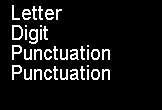 |
| 2. | Determining If A Character Is Within A Specified Range | |  |
| 3. | Is a char in a range: Case Insensitive | |  |
| 4. | Is a char in a range Exclusively | |  |
| 5. | Using Char | | |
| 6. | Escape Characters | | |
| 7. | A stack class for characters | |  |
| 8. | Encode or decode a message | | |
| 9. | Demonstrate several Char methods | | 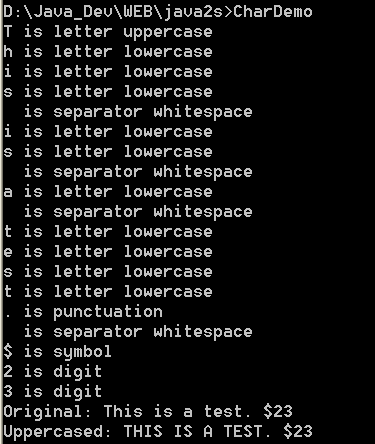 |
| 10. | Demonstrate the ICharQ interface: A character queue interface | | 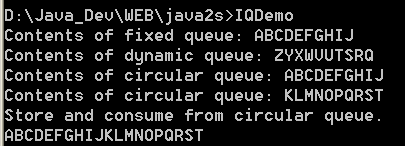 |
| 11. | A set class for characters | | 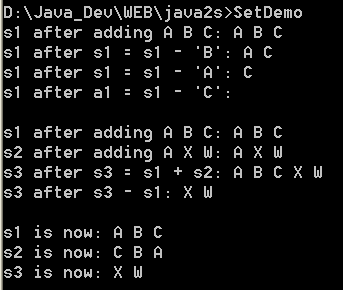 |
| 12. | A queue class for characters | | 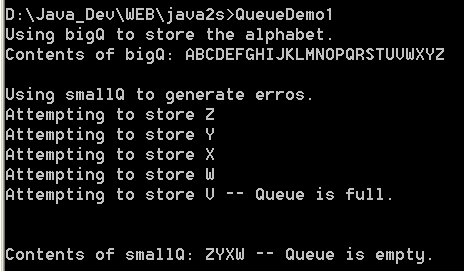 |
| 13. | IsDigit, IsLetter, IsWhiteSpace, IsLetterOrDigit, IsPunctuation | | |
| 14. | Char: Get Unicode Category | | |
| 15. | Char.IsLowSurrogate(), IsHighSurrogate(), IsSurrogatePair() method | | |
| 16. | demonstrates IsSymbol. | | |
| 17. | Test an input character if it is contained in a character list. | | |
| 18. | Is vowel char | | |
| 19. | Filter letter and digit | | |
| 20. | First Char Upper | | |